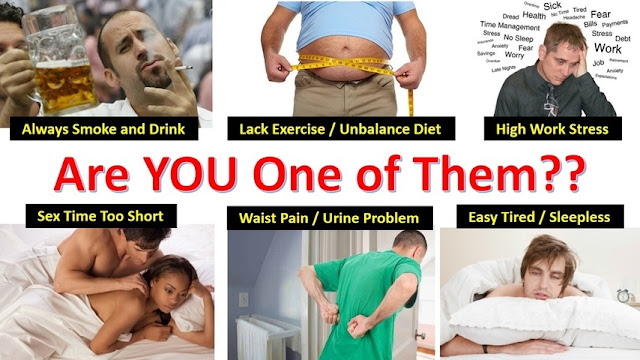Men are
paying the price for neglecting their health. More than 100,000 men a year die
prematurely according to UK statistic. Every year in the United States, around
2 million people die, according to the Centers for Disease Control and
Prevention (CDC). On average, more than 600,000 die of heart diseases and
followed by prostate cancer and lung cancer.
 Premature mortality, measured in terms of potential years of life lost before the age of 70 years, focuses on deaths among younger age groups of the population. Rates of premature mortality are higher among males in all countries.
Premature mortality, measured in terms of potential years of life lost before the age of 70 years, focuses on deaths among younger age groups of the population. Rates of premature mortality are higher among males in all countries. On average, men go to their GP half as often as women. It's important to be aware of changes to your health, and to see your GP immediately if you notice something that's not right. Below are five important health issues for men and the symptoms you should never ignore.
Impotence
 Many men have sexual problems or have problems getting or keeping an erection
(impotence) at some point. They become more common as men age.
Problems can include:
Many men have sexual problems or have problems getting or keeping an erection
(impotence) at some point. They become more common as men age.
Problems can include:
·
Reduced or lost interest in sex
·
Problems with ejaculation
·
Low testosterone
Stress, illness, medicines, or emotional problems may also
be factors. Occasional problems with sexual function are common. If problems
last more than a few months or cause distress for you or your partner, you
should see your GP. Your
GP is likely to assess your general health because impotence, also known as
erectile dysfunction, can be a sign of more serious conditions, such as heart
disease, diabetes or high blood pressure.
Half of
all men over 40 have had trouble getting an erection at least once. Read about
the causes of sexual problem and where to get help.
A lump on your testicle
Testicular
cancer is the most common cancer in men aged 20 to 35. Nearly 2,000 men are
diagnosed with testicular cancer each year in the UK. More than 200,000 men
living with testis cancer in the United States and more than 8,000 new cases of
testicular cancer will be diagnosed.
 If you
notice a lump or abnormality in your testicles, first see your GP. Most
testicular lumps are not cancer, but it is essential to have any abnormalities
checked. This is because treatment for testicular cancer is much more effective
if the cancer is diagnosed early.
If you
notice a lump or abnormality in your testicles, first see your GP. Most
testicular lumps are not cancer, but it is essential to have any abnormalities
checked. This is because treatment for testicular cancer is much more effective
if the cancer is diagnosed early.
Testicular cancer is not common; about 1 of every 263 males
will develop testicular cancer at some point during his life. This is largely a
disease of young and middle-aged men. The average age at the time of diagnosis
of testicular cancer is about 33.
Moles
 Check your
moles regularly and be aware of any change in colour or shape, or if they start
bleeding. Most changes are harmless and are due to a non-cancerous increase of
pigment cells in the skin.
Check your
moles regularly and be aware of any change in colour or shape, or if they start
bleeding. Most changes are harmless and are due to a non-cancerous increase of
pigment cells in the skin.
See your
GP if a mole looks unusual or becomes itchy. It can then be checked and removed
if necessary. To minimise your risk of skin cancer, avoid exposure to the sun
between 11am and 3pm. Cover up and use sunscreen with a sun protection factor
of at least 15 when you're in the sun.
You should check your skin every few months for any new
moles that develop (particularly after your teenage years, when new moles
become less common) or any changes to existing moles. A mole can change in
weeks or months.
- moles with uneven colouring – most moles only have one or two colours, but melanomas have lots of different shades
- moles with an uneven or ragged edge – moles are usually circular or oval with a smooth border
- bleeding, itching, red, inflamed (swollen) or crusty moles
- moles that get a lot bigger – most moles are no bigger than the width of a pencil.
A helpful way to remember what to look for is to
use the ABCDE method.
A – asymmetry
B – border irregularity
C – colour change
D – diameter
E – elevated (raised) or enlarged
Feeling depressed
 If you’re
depressed, you may lose interest in things you used to enjoy. If you’ve been
having feelings of extreme sadness, contact your GP. Depression is a real
illness with real effects on your work, social and family life. Treatment usually
involves a combination of self help, talking therapies and drugs.
If you’re
depressed, you may lose interest in things you used to enjoy. If you’ve been
having feelings of extreme sadness, contact your GP. Depression is a real
illness with real effects on your work, social and family life. Treatment usually
involves a combination of self help, talking therapies and drugs.
Depression
is more common in women, but men are far more likely to commit suicide. This
may be because men are more reluctant to seek help. Financial stress: job insecurity, redundancy
and debt can all affect your mental wellbeing.
Trouble urinating
 When the
prostate is enlarged, it can press on the tube that carries urine from the
bladder. This can make it hard to pass urine, which can be a sign of prostate disease, including cancer.
When the
prostate is enlarged, it can press on the tube that carries urine from the
bladder. This can make it hard to pass urine, which can be a sign of prostate disease, including cancer.
Prostate
cancer is the most common cancer in men in the UK. More than 30,000 men are
diagnosed with it every year. In United State, about
6 cases in 10 are diagnosed in men aged 65 or older. The average age at the
time of diagnosis is about 66. Prostatecancer is
the second leading cause of cancer death in American men. About 1 man in 38 will die of prostate cancer.
 Every man
has a prostate gland and it’s crucial to your sex life. Other symptoms include
pain or burning when you pass urine and frequently waking up in the night to
pee. If you have any of these symptoms, see your GP.
Every man
has a prostate gland and it’s crucial to your sex life. Other symptoms include
pain or burning when you pass urine and frequently waking up in the night to
pee. If you have any of these symptoms, see your GP.
These symptoms include:
·
A
need to urinate frequently, especially at night.
·
Difficulty
starting urination or holding back urine.
·
Weak
or interrupted flow of urine.
·
Painful
or burning urination.
·
Difficulty
in having an erection.
·
Painful
ejaculation.
·
Blood
in urine or semen.




























